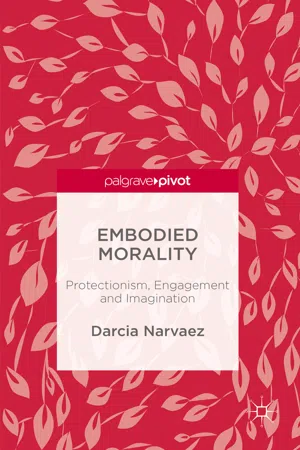Abstract
Triune ethics meta-theory (TEM) differs from other theories of moral psychological development, integrating neurobiological, psychological, philosophical, and developmental literatures on moral functioning. TEM grounds itself in an evolutionary systems approach specifically Evolutionary Relational Developmental Systems Meta-Theory. TEM identifies ethical orientations that emerge from global brain states rooted in human brain evolution: self-protectionism, engagement, and imagination, respectively. Each global brain state displays different goals: self-preservation, affiliation, and reflection, respectively. Adult functioning is largely the result of dynamic interactionism during sensitive periods of development, building implicit sociomoral understandings that guide moral behavior. Alternative moral developmental pathways may ensue from psychosocial experience during development.
Triune ethics meta-theory (TEM) is a broad, inclusive theory that seeks to explain the different patterns of moral development seen in the world today. TEM is rooted in ethical naturalism—what humans are really like, especially in light of evolution and a developmental life course. TEM integrates scholarship from multiple domains and seeks to explain lifespan moral development, or ethogenesis.1 It proposes that the ways humans are raised brings about tendencies toward self-protective or open-hearted social relations. When the life course follows evolutionary systems, then prosocial, open-hearted capacities develop. When the life course goes against evolutionary systems it should not be a surprise that self-focused values and behaviors develop such as violent tribalism, self-aggrandizement, and a binary orientation to others (dominance or submission). Many humans alive today exhibit impaired capacities in comparison to humans from small-band hunter-gatherer (SBHG) societies, the type of society that represents 99 % of humanity’s history and that stays closer to the evolved system for developing the young.2
In integrating scholarship from multiple domains, TEM contrasts with most of psychological and philosophical theories about moral development. It takes a broader view than reasoning/judgment or emotion and intuition, focusing on the implicit socio-emotional-cognitive-action capacities and rationality that are rooted in neurobiological function and initiated in early life and that continue to subliminally influence adult morality. Experiences in early life, when caregiving shapes brain and body, engrave neurobiological systems and functions that underlie the ethical dispositions guiding one’s social life.
The Setting
Several assumptions have governed moral developmental theory (and sometimes still do). I briefly examine three of them: rationalism, individualism, and fixedness.
Rationalism
The dominant philosophical paradigm for understanding human morality is rationalism, which Immanuel Kant most famously represents. Rationalism emphasizes reasoning impartially about what is the right thing to do in a particular situation, narrowing obligations to reasoned duties that almost everyone can carry out.3 The focus is on right action that mostly has to do with respecting the rights of others. Moral action comes from the powers of reason, will, and explicit decision making.
Recent empirical findings across the behavioral sciences have thrown rationalism on the rocks, indicating that conscious deliberate reasoning rarely directly guides moral decisions and actions in the moment.4 Instead, implicit processes are now assumed to govern most decisions and actions.5 Although some suggest that emotions primarily guide decisions and processing,6 emotions represent only one aspect of a host of implicit, experience-based elements an individual brings to a situation such as basic understandings of how the world works, including the social world (e.g., trust/distrust of others); one’s emotional set, mood, and feelings; general physiological well-being and stress reactivity; perceptual bias based on past experience and current goals and other complexities of a dynamic system interacting with other dynamic systems; as well as habits of practice.7
Similar to the dominant focus in moral philosophy, dominant paradigms in empirical moral psychology initially emphasized reasoning, such as those of Piaget
8 and Kohlberg.
9 However, it must be understood that the aims of groundbreaking work of Piaget included mapping genetic epistemology, focusing on the emergence of sophisticated explicit reasoning
from implicit understandings (schemas) that form from active experience and how understandings change over time based on the interaction between cognitive development and experience. Adopting some misunderstandings of Piaget such as a hard-stage theory,
10 Lawrence Kohlberg attempted to map development of explicit reasoning about justice over the course of childhood and adolescence. Both Piaget and Kohlberg emphasized the development of reasoning and moral decision making, with Piaget focusing on notions of cooperation and Kohlberg on notions of justice. Examining notions of harm and fairness, Turiel
11 noted a gap in Kohlberg’s theory in understanding young children’s moral reasoning development. Turiel found that more than Kohlberg’s Stage 1 (fear of punishment) guided children’s reasoning about right action. Turiel and colleagues demonstrated that children are able to make distinctions among issues of convention (e.g., etiquette), personal choice, and morality (social harm and fairness). Lately, studies of preverbal infants show sensitivity to helpful and unhelpful puppets whom infants appear to evaluate as good or bad, preferring the good.
12 These recent moral theoretical trends, which have begun to incorporate implicit and emotional processes, still emphasize individual
judgment.
13 Although reasoning and judgment have not been the focus of every moral psychologist, research outside of reasoning and judgment typically still emphasizes
cognitive (in the narrow sense) development and
cognitive processes.
14 TEM moves beyond cognitive processes to address the dynamic development of young children “all the way down” to neurobiology. Early life shapes physiological systems that underlie cognition and emotion, reasoning, and intuitions. In the early months and years, neurobiological systems are being established, highly influenced by the caregiving environment, for example, neuroendocrine systems (e.g., oxytocin function), neurotransmitter and immune systems (e.g., serotonin for both), vagus nerve f...
